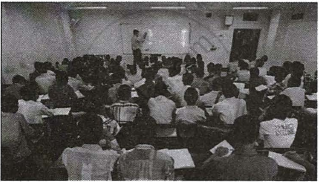Advertisements
Advertisements
Question
Find the value of k for which the system of linear equations has an infinite number of solutions:
5x + 2y = 2k,
2(k + 1)x + ky = (3k + 4).
Solution
The given system of equations:
5x + 2y = 2k
⇒ 5x + 2y - 2k = 0 ….(i)
And, 2(k + 1)x + ky = (3k + 4)
⇒ 2(k + 1)x + ky - (3k + 4) = 0 …(ii)
These equations are of the following form:
`a_1x+b_1y+c_1 = 0, a_2x+b_2y+c_2 = 0`
where, `a_1 = 5, b_1= 2, c_1= -2k and a_2 = 2(k + 1), b_2 = k, c_2= -(3k + 4)`
For an infinite number of solutions, we must have:
`(a_1)/(a_2) = (b_1)/(b_2) = (c_1)/(c_2)`
`5/(2(k+1)) = 2/k = (−2k)/(−(3k+4))`
⇒52(𝑘+1) = 2𝑘 = 2𝑘(3𝑘+4)
Now, we have the following three cases:
Case I:
`5/(2(k+1)) = 2/k`
⇒ 2 × 2(k + 1) = 5k
⇒ 4(k + 1) = 5k
⇒ 4k + 4 = 5k
⇒ k = 4
Case II:
`2/k = (2k(3k+4))`
⇒ `2k^2` = 2 × (3k + 4)
`⇒ 2k^2 = 6k + 8 ⇒ 2k^2 – 6k – 8 = 0`
`⇒ 2(k^2 – 3k – 4) = 0`
⇒ k2 – 4k + k – 4 = 0
⇒ k(k – 4) + 1(k – 4) = 0
⇒ (k + 1) (k – 4) = 0
⇒ (k + 1) = 0 or (k – 4) = 0
⇒ k = -1 or k = 4
Case III:
`5/(2(k+1)) = (2k)/((3k+4))`
`⇒ 15k + 20 = 4k^2 + 4k`
`⇒ 4k^2 – 11k – 20 = 0`
`⇒ 4k^2– 16k + 5k – 20 = 0`
⇒ 4k(k – 4) + 5(k – 4) = 0
⇒ (k – 4) (4k + 5) = 0
`⇒ k = 4 or k = (−5)/4`
Hence, the given system of equations has an infinite number of solutions when k is equal to 4.
APPEARS IN
RELATED QUESTIONS
Solve for x and y:
6(ax + by) = 3a + 2b,
6(bx – ay) = 3b – 2a
Solve for x and y:
`(bx)/a - (ay)/b + a + b = 0, bx – ay + 2ab = 0`
For what value of k, the system of equations
x + 2y = 5,
3x + ky + 15 = 0
has (i) a unique solution, (ii) no solution?
For what value of k, the system of equations
x + 2y = 3,
5x + ky + 7 = 0
Have (i) a unique solution, (ii) no solution?
Also, show that there is no value of k for which the given system of equation has infinitely namely solutions
Find the value of k for which the system of linear equations has a unique solution:
(k – 3) x + 3y – k, kx + ky - 12 = 0.
Five years hence, a man’s age will be three times the sum of the ages of his son. Five years ago, the man was seven times as old as his son. Find their present ages
The present age of a man is 2 years more than five times the age of his son. Two years hence, the man’s age will be 8 years more than three times the age of his son. Find their present ages.
90% and 97% pure acid solutions are mixed to obtain 21 litres of 95% pure acid solution. Find the quantity of each type of acid to be mixed to form the mixture.
Read the following passage:
|
A coaching institute of Mathematics conducts classes in two batches I and II and fees for rich and poor children are different. In batch I, there are 20 poor and 5 rich children, whereas in batch II, there are 5 poor and 25 rich children. The total monthly collection of fees from batch I is ₹9,000 and from batch II is ₹26,000. Assume that each poor child pays ₹x per month and each rich child pays ₹y per month.
|
Based on the above information, answer the following questions:
- Represent the information given above in terms of x and y.
- Find the monthly fee paid by a poor child.
OR
Find the difference in the monthly fee paid by a poor child and a rich child. - If there are 10 poor and 20 rich children in batch II, what is the total monthly collection of fees from batch II?
A lending library has a fixed charge for first three days and an additional charge for each day thereafter. Rittik paid 27 for a book kept for 7 days and Manmohan paid ₹ 21 for a book kept for 5 days. Find the fixed charges and the charge for each extra day.

